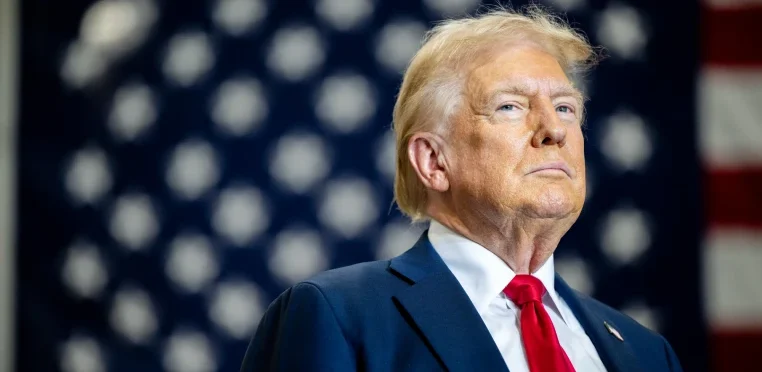President-elect Donald Trump has petitioned the U.S. Supreme Court to postpone his sentencing in a New York criminal case involving alleged hush money payments, arguing that proceeding with the sentencing during the presidential transition period could interfere with his duties as the incoming president. The case, which has garnered national attention, highlights the legal challenges Trump continues to face even as he prepares to assume the presidency for a second term.
Background on the Case
The case stems from Trump’s conviction in April 2024 on 34 felony counts of falsifying business records. Prosecutors in Manhattan alleged that these records were altered to conceal payments made to adult film actress Stormy Daniels during Trump’s 2016 presidential campaign. The payments were intended to suppress allegations of an extramarital affair, which Trump denies. He has consistently maintained that the charges are politically motivated and part of a broader effort to undermine him.
The sentencing is scheduled for January 10, 2025, just ten days before Trump’s inauguration. While the presiding judge, Juan M. Merchan, has indicated that the sentence will likely involve an unconditional discharge—meaning no jail time, fines, or probation—Trump’s legal team contends that the felony conviction itself carries significant collateral consequences, including potential reputational harm and future legal vulnerabilities.
Supreme Court Appeal
Trump’s lawyers filed an emergency petition with the Supreme Court after their previous appeals to New York state courts were denied. In their filing, they argued that conducting the sentencing during the transitional period between presidencies risks interfering with Trump’s ability to prepare for his role as president. They further asserted that the legal principle of presidential immunity, which protects sitting presidents from certain legal proceedings, should extend to the president-elect in matters that could disrupt the transition process.
“This case raises significant constitutional questions about the balance between the judicial process and the executive branch,” Trump’s attorney Susan Necheles said in a statement. “The integrity of the presidential transition must not be compromised by politically charged legal actions.”
Response from the Manhattan District Attorney
The Manhattan District Attorney’s office, which brought the charges against Trump, has been ordered to respond to the Supreme Court petition by Thursday. Prosecutors have argued throughout the case that Trump’s status as president-elect does not exempt him from accountability under state law. They point out that the sentencing hearing itself is largely procedural, given that Judge Merchan has already signaled he does not intend to impose any punitive measures.
Judge’s Position and Sentencing Implications
Judge Merchan, who oversaw the trial, emphasized that his expected sentence—an unconditional discharge—would not impede Trump’s ability to govern. However, Trump’s legal team has underscored the broader implications of a felony conviction, which could carry significant reputational and practical consequences even if no immediate penalties are imposed.
Legal experts have noted that while the sentence itself may be minimal, the felony conviction could pose challenges for Trump in unrelated legal proceedings, as well as for his standing on the international stage as a world leader.
Potential Supreme Court Ruling
If the Supreme Court agrees to take up the case, it could set a precedent for how legal proceedings against a president-elect are handled. Some legal scholars argue that delaying the sentencing could create a perception of special treatment for elected officials, while others contend that ensuring the smooth transition of power is a matter of national importance.
“The court’s decision will likely be as much about the optics as it is about the legal questions,” said Jessica Levinson, a constitutional law professor. “It’s a delicate balancing act between respecting the rule of law and acknowledging the unique responsibilities of the presidency.”
Political and Public Reaction
The case has drawn sharp reactions from across the political spectrum. Trump’s supporters have rallied around him, echoing his claims that the charges are part of a politically motivated “witch hunt.” Opponents, meanwhile, argue that the legal system must hold all individuals accountable, regardless of their political status.
Public opinion on the case remains divided, with some viewing it as a test of the judicial system’s impartiality and others questioning whether Trump’s legal challenges could distract from his ability to govern effectively.
What’s Next?
As the sentencing date approaches, all eyes are on the Supreme Court to determine whether it will intervene. A decision on Trump’s petition is expected within days, given the urgency of the timeline. If the Court denies the request, Trump’s sentencing will proceed as scheduled, potentially marking a historic moment where a president-elect faces a felony conviction just days before taking office.
In the meantime, Trump’s team has vowed to exhaust all legal options to protect his ability to lead. “This is not just about one man,” Necheles said. “It’s about the future of the presidency and the fair application of justice in this country.”
A Broader Legal Landscape
Trump’s legal challenges extend beyond the New York hush money case. He remains the subject of multiple investigations, including federal inquiries into his actions surrounding the 2020 election and the classified documents found at his Mar-a-Lago residence. The outcome of these cases could have further implications for his presidency and political legacy.
As the nation watches this unprecedented legal battle unfold, the intersection of law, politics, and governance continues to shape the contours of Trump’s historic return to the White House.

